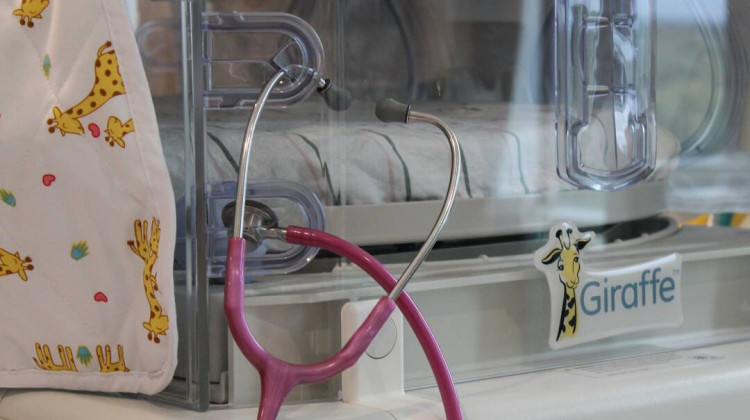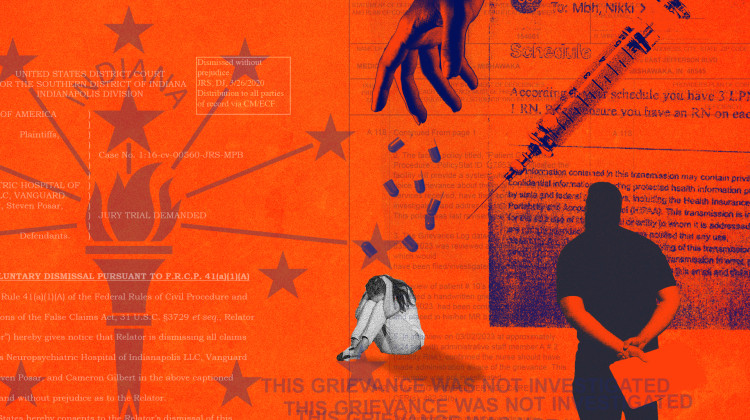
Glynita Bell says she formed her business, Heart 2 Heart Wellness Center, to help more Black women gain emotional support.
Courtesy Glynita BellWhile listening to the disturbing details of how 26-year-old Breonna Taylor was shot to death by Louisville police officers in her own apartment, Glynita Bell had a sudden thought about Taylor, who lived just miles away from her New Albany, Indiana home.
“What I know for sure as a clinician is women are the backbone of our families, of our workspaces, of our communities,” she says.
She got to work in the way she could, offering Black women demonstrating on behalf of Taylor free therapy services through a program she calls The Breathe Initiative.
“To watch these women sacrifice their emotional well-being to advocate in the way that they were, the only thing I could do was be responsive.”
Amid the twin pandemics of the disproportionate impact of the coronavirus on Black Hoosiers and the reckoning with systemic racism in America, Bell, a behavioral therapist and licensed clinical social worker, says she’s opened her door to more Black women who need emotional support.
Last month, her business, Heart 2 Heart Wellness Center, expanded its wellness self-care services into Indianapolis and Louisville and increased its workforce by 76 percent, to meet the need.
“If you are willing to sacrifice, or should I say risk your health in a pandemic -- because the police were often unkind and aggressive -- as well as deplete yourself mental health-wise,” she says, “the very least I could do is offer my skill set to help you just talk it through.”
Research shows African-Americans are less likely to access treatment for mental illness. The Indiana State Department of Health reports the percentage of African Americans who seek mental health care is 25 percent compared to 40 percent of their white counterparts as of 2017.
Cultural norms and the stigma associated with having a mental illness are partly to blame, according to Shardé Smith, assistant professor of human development and family studies at the University of Illinois at Urbana-Champaign.
Bell says to dispel these stigmas, she’s focused on making a space feel cozy, not clinical. Her Wellness Center in New Albany -- a southern Indiana town perched along the Ohio River, across from Louisville -- is a spa-like setting in a mission to remove the negative stigma of receiving mental health therapy.
When clients step into the facility, they can participate in yoga, meditation and massages, as well as speak to a licensed therapist.
Bell’s also expanded her telehealth platform for online therapy and appointments so more women in the Midwest can practice wellness techniques in the privacy of their own homes.
She wants to empower more Black women to embrace boundaries as a way to cope.
Alicia Mckoy, founder of mental well-being firm, Peak Mind in Indianapolis says working from home has magnified the work environment and made it harder to find balance.
“Before people could go clock in, clock out, leave work there, not take it home and create that mental barrier separation,” Mckoy says. “Now, you're working on your sofa, you're working in your bedroom, so it’s as if we've crossed and blurred this line. Now our emotions are even more entangled with it all,” she says.
She encourages all workers to ask their employer about employee assistance programs, which often offer free counseling sessions.
Through her free therapy sessions, Bell hopes to hold space for more women to make self-care a “priority.”
“We empower our clients to reach their full potential by encouraging them to own and elevate their self-care,” she says. “Being responsible for your mental health is genuinely just good, old self-care.”
This story was produced by Side Effects Public Media, a news collaborative covering public health.
 DONATE
DONATE






 Support WFYI. We can't do it without you.
Support WFYI. We can't do it without you.